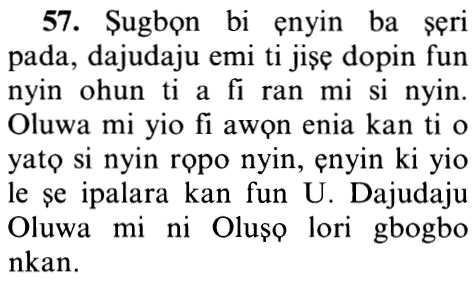11vs57
Select any filter and click on Go! to see results
فَإِن تَوَلَّوْاْ فَقَدْ أَبْلَغْتُكُم مَّا أُرْسِلْتُ بِهِ إِلَيْكُمْ وَيَسْتَخْلِفُ رَبِّي قَوْماً غَيْرَكُمْ وَلاَ تَضُرُّونَهُ شَيْئاً إِنَّ رَبِّي عَلَىَ كُلِّ شَيْءٍ حَفِيظٌ
Fain tawallaw faqad ablaghtukum ma orsiltu bihi ilaykum wayastakhlifu rabbee qawman ghayrakum wala tadurroonahu shayan inna rabbee AAala kulli shayin hafeethun
Index Terms
Click to play
Yoruba Translation

Hausa Translation
"To! Idan kun jũya, haƙĩƙa, nã iyar muku abin da aka aiko ni da shi zuwa gare ku. Kuma Ubangijĩna Yanã musanya waɗansu mutãne, waɗansunku su maye muku. Kuma bã ku cũtar Sa da kõme. Lalle Ubangijina a kan dukkan kõme, Matsari ne."
Asbabu n-Nuzuul (Occasions of Revelation)
Allah tells;
فَإِن تَوَلَّوْاْ فَقَدْ أَبْلَغْتُكُم مَّا أُرْسِلْتُ بِهِ إِلَيْكُمْ ...
So if you turn away, still I have conveyed the Message with which I was sent to you.
Hud says to them, "If you turn away from that which I have brought to you in reference to worship of Allah, Who is your Lord alone, without any partners, then the proof has been established against you. This is because I have conveyed the Message of Allah to you, which He has sent me with.''
... وَيَسْتَخْلِفُ رَبِّي قَوْمًا غَيْرَكُمْ ...
My Lord will make another people succeed you,
This refers to a group of people who will worship Allah alone, without associating anything with Him.
This also implies that the polytheists do not bother Allah and they do not harm Him in the least with their disbelief. To the contrary, their disbelief merely harms their own selves.
... وَلاَ تَضُرُّونَهُ شَيْئًا ...
and you will not harm Him in the least.
... إِنَّ رَبِّي عَلَىَ كُلِّ شَيْءٍ حَفِيظٌ ﴿٥٧﴾
Surely, my Lord is Guardian over all things.
This means that Allah is a Witness and Guardian over the statements of His servants and their actions. He will give them due recompense for their actions. If they do good deeds, He will reward them with good. If they do evil, He will punish them with evil.
يقول لهم هود فإن تولوا عما جئتكم به من عبادة الله ربكم وحده لا شريك له فقد قامت عليكم الحجة بإبلاغي إياكم رسالة الله التي بعثني بها " ويستخلف ربي قوما غيركم" يعبدونه وحده لا يشركون به ولا يبالي بكم فإنكم لا تضرونه بكفركم بل يعود وبال ذلك عليكم " إن ربي على كل شيء حفيظ " أي شاهد وحافظ لأقوال عباده وأفعالهم ويجزيهم عليها إن خيرا فخير وإن شرا فشر .
"فإن تولوا" فيه حذف إحدى التاءين أي تعرضوا "فقد أبلغتكم ما أرسلت به إليكم ويستخلف ربي قوما غيركم ولا تضرونه شيئا" بإشراككم "إن ربي على كل شيء حفيظ" رقيب
في موضع جزم ; فلذلك حذفت منه النون , والأصل تتولوا , فحذفت التاء لاجتماع تاءين .
I'raab - grammatical analysis of the Qur'an
«فَإِنْ» الفاء استئنافية وإن شرطية.
«تَوَلَّوْا» مضارع مجزوم لأنه فعل الشرط وعلامة جزمه حذف النون والواو فاعل والجملة ابتدائية وجملة إن إلخ استئنافية.
«فَقَدْ» الفاء رابطة للجواب وقد حرف تحقيق.
«أَبْلَغْتُكُمْ» ماض وفاعله ومفعوله الأول والجملة في محل جزم جواب الشرط.
«ما» اسم موصول مفعول به ثان.
«أُرْسِلْتُ» ماض مبني للمجهول والتاء نائب الفاعل.
«بِهِ» متعلقان بأرسلت والجملة صلة.
«إِلَيْكُمْ» متعلقان بحال محذوفة.
«وَيَسْتَخْلِفُ» الواو استئنافية ومضارع مرفوع والجملة مستأنفة.
«رَبِّي» فاعل مرفوع بالضمة المقدرة على ما قبل ياء المتكلم منع من ظهورها الحركة المناسبة والياء مضاف إليه.
«قَوْماً» مفعول به.
«غَيْرَكُمْ» صفة والكاف مضاف إليه.
«وَلا» الواو عاطفة ولا نافية.
«تَضُرُّونَهُ» مضارع مرفوع والواو فاعل والهاء مفعول به أول والجملة معطوفة.
«شَيْئاً» مفعول به ثان.
«إِنَّ رَبِّي» إن واسمها والياء مضاف إليه.
«عَلى كُلِّ» متعلقان بحفيظ.
«شَيْ ءٍ» مضاف إليه.
«حَفِيظٌ» خبر والجملة تعليل.
